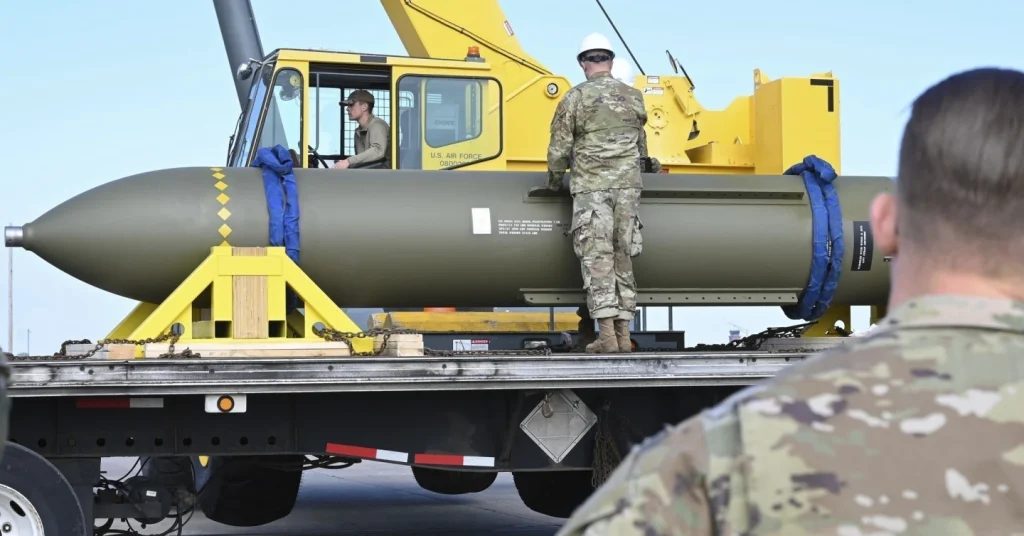US President Donald Trump is warming towards joining Israel’s fight against Iran and using US military to hit nuclear facilities.
US President Donald Trump is growing increasingly warm to using US military assets to strike Iranian nuclear facilities and souring on the idea of a diplomatic solution to end Tehran’s escalating conflict with Israel, two officials familiar with the ongoing discussions told CNN.
The new, more hawkish posture represents a significant shift in Trump’s thinking, though the sources said Trump remains open to a diplomatic solution — if Iran makes significant concessions.
Over the weekend and into Monday, discussions among Trump administration officials had continued to center on trying to find a diplomatic solution to serve as an off-ramp, sources familiar with the talks said.
On Tuesday, Trump signaled his patience for diplomacy was wearing thin. “I’m not too much in the mood to negotiate with Iran,” he told reporters aboard Air Force One returning early from the Group of 7 summit in Canada. He added that his objective in Iran was “an end, a real end, not a ceasefire,” or “giving up entirely.”
The US President said the US knows where Iran’s Supreme Leader Ayatollah Ali Khamenei is hiding during the Israel-Iran conflict but doesn’t want him killed “for now.” Trump urged, in a social media posting, Iran’s “UNCONDITIONAL SURRENDER” as the five-day conflict continues to escalate.
“We know exactly where the so-called ‘Supreme Leader’ is hiding,” Trump added. “He is an easy target, but is safe there – We are not going to take him out (kill!), at least not for now. But we don’t want missiles shot at civilians, or American soldiers. Our patience is wearing thin,” reports AP.
Trump’s increasingly muscular comments toward the Iranian government come after he urged Tehran’s 9.5 million residents to flee for their lives as he cut short his participation in an international summit to return to Washington for urgent talks with his national security team.

Trump in the opening days of the conflict rejected a plan presented by Israel to kill Khamenei, according to a US official familiar with the matter, who was not authorized to comment on the sensitive matter and spoke on the condition of anonymity.
The Israelis had informed the Trump administration that they had developed a credible plan to kill Khamenei. But White House officials informed the Israelis that Trump opposed such a move.
Administration officials were concerned that the plan to kill Khamenei could enflame the conflict and potentially destabilize the region.
Trump returned to the White House from his abbreviated trip to the Group of Seven summit in the Canadian Rockies early Tuesday at a moment of choosing in his presidency.
Israel, with five days of missile strikes, has done considerable damage to Iran and believes it can now deal a permanent blow to Tehran’s nuclear program — particularly if it gets a little more help from the Republican president.
But deepening American involvement, perhaps by providing the Israelis with bunker-busting bombs to penetrate Iranian nuclear sites built deep underground or offering other direct U.S. military support, comes with enormous political risk for Trump. Trump, as he made his way back to Washington, expressed frustration with Iranian leaders for failing to reach an agreement. He said he was now looking for “a real end” to the conflict and a “complete give-up” of Tehran’s nuclear program.
“They should have done the deal. I told them, ‘Do the deal,’” Trump told reporters on Air Force One. “So I don’t know. I’m not too much in the mood to negotiate.”
Iran has insisted that its nuclear program is for peaceful purposes only, and U.S. intelligence agencies have assessed that Tehran is not actively pursuing a bomb. Trump, who held a Situation Room meeting with advisers on Tuesday afternoon, has been gradually building the public case for a more direct American role in the conflict. His shift in tone comes as the US has repositioned warships and military aircraft in the region to respond if the conflict between Israel and Iran further escalates.
Meanwhile, the State Department created a special task force to assist Americans seeking to leave Israel and other Mideast countries, although no government evacuations are currently planned. There are some 700,000 Americans, many of them dual U.S.-Israeli citizens, now in Israel and thousands more in other Mideast countries, including Iran.


